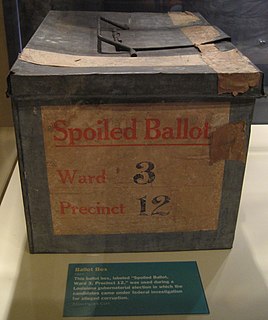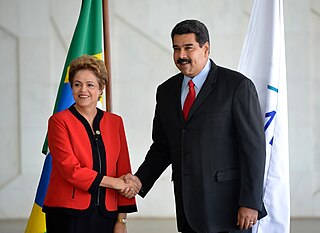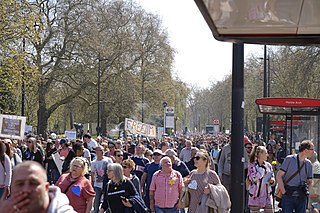2020 Colombian protests may refer to:
2020 Colombian protests may refer to:

The Revolutionary Armed Forces of Colombia—People's Army was a guerrilla group involved in the continuing Colombian conflict starting in 1964. They were known to employ a variety of military tactics in addition to more unconventional methods, including terrorism. The FARC–EP was formed during the Cold War period as a Marxist–Leninist peasant force promoting a political line of agrarianism and anti-imperialism.

Sebastián de Belalcázar was a Spanish conquistador. De Belalcázar, also written as de Benalcázar, is known as the founder of important early colonial cities in the northwestern part of South America; Quito in 1534 and Cali, Pasto and Popayán in 1537. De Belalcázar led expeditions in present-day Ecuador and Colombia and died of natural causes after being sentenced to death in Cartagena, at the Caribbean coast in 1551.

A protest vote is a vote cast in an election to demonstrate dissatisfaction with the choice of candidates or the current political system. Protest voting takes a variety of forms and reflects numerous voter motivations, including political alienation.

The National Liberation Army is a revolutionary left-wing armed group involved in the continuing Colombian conflict, which has existed in Colombia since 1964. The ELN advocate a composite communist ideology of Marxism-Leninism and liberation theology. In 2013, it was estimated that the ELN forces consisted of between 1,380 and 3,000 guerrillas. According to former ELN national directorate member Felipe Torres, one fifth of ELN supporters have taken up arms. The ELN has been classified as a terrorist organization by the governments of Colombia, Peru, United States, Canada the European Union and Venezuela's National Assembly.

Miguel Abadía Méndez was the 12th President of Colombia (1926–1930). A Conservative party politician, Abadía was the last president of the period known as the Conservative Hegemony, running unopposed and forming a one party Cabinet.

Colombia–Russia relations refers to the bilateral and foreign relations between Colombia and Russia. Diplomatic relations between Colombia and the USSR were established for the first time on June 25, 1935. Colombia has an embassy in Moscow and Russia has an embassy in Bogotá.

Stefanía Fernández Krupij is a Venezuelan TV host, model and beauty queen who won the Miss Venezuela 2008 and Miss Universe 2009 titles. She earned a Guinness World Records by being the first Miss Universe winner who was crowned by a compatriot.

José Álvaro Osorio Balvín, better known as J Balvin, is a Colombian reggaeton singer. He has been referred to as the "Prince of Reggaeton", and is one of the best-selling Latin music artists with sales of more than 35 million records worldwide. Balvin was born in Medellín, Colombia. At age 17, he moved to the United States to learn English, where he lived in both Oklahoma and New York. He then returned to Medellín and gained popularity performing at clubs in the city.

On 13 May 2016 a state of emergency was declared in Venezuela by President Nicolás Maduro. The details of this emergency condition were not explained by Maduro but he mentioned conspiracy within the country and from an OPEC country and the United States to overthrow the Caracas government. The last state of emergency occurred in 2015 due to issues near the Colombian border, resulting in the suspension of constitutional guarantees and the Venezuela–Colombia migrant crisis.

Iván Duque Márquez, is a Colombian politician and lawyer who is the current president of Colombia, in office since 7 August 2018. He was elected as Colombia's youngest president, as the candidate from the Democratic Centre Party in the 2018 presidential election. Backed by his mentor, former president and senator Alvaro Uribe, he ran a campaign where he stood against the Havana Accords with the guerilla group FARC.

The Venezuelan presidential crisis is an ongoing crisis concerning the leadership and the legitimate president of Venezuela which has been contested since 10 January 2019, with the nation and the world divided in support for Nicolás Maduro or Juan Guaidó. The process and results of the 20 May 2018 presidential election were widely disputed. The opposition-majority National Assembly declared Maduro a "usurper" of the presidency on the day of his second inauguration and disclosed a plan to set forth its president Guaidó as the succeeding acting president of the country under article 233 of the Venezuelan Constitution. A week later, the Supreme Tribunal of Justice declared that the presidency of the National Assembly was the "usurper" of authority and declared the body to be unconstitutional.

The 2019–2020 Colombian protests were a collection of protests that began on 21 November 2019. Hundreds of thousands of Colombians demonstrated for various reasons. Some protested against income inequality, corruption, police brutality and various proposed economic and political reforms proposed by the government of Iván Duque Márquez, others against the few violent protestors and in favor of the Colombian peace process, etc.
Char is a French feminine given name that is a variation of Chardonnay, Charlene, and Charlotte and a feminine form of Charles. Char is also used as a variation of Charmaine. Notable people with this name include the following:
Calle is a Danish, Finnish, Norwegian and Swedish masculine given name, nickname and surname that is a diminutive form of Carl and Karl and an alternate form of Kalle. Calle is a surname with Spanish, English, Irish, Scottish, and German origins. Its Spanish origins are from the Spanish word calle, which means street and traces its origins back to Santander, Spain. a derive Notable people referred to by this name include the following:
Events in the year 2020 in Colombia.

On May 25, 2020, George Floyd, a 46-year-old black man, was murdered in Minneapolis, Minnesota, United States, while being arrested on suspicion of using a counterfeit $20 bill. During the arrest, Derek Chauvin, a white police officer with the Minneapolis Police Department, knelt on Floyd's neck for 9 minutes and 29 seconds after he was handcuffed and lying face down. Two other police officers, J. Alexander Kueng and Thomas Lane, assisted Chauvin in restraining Floyd. A fourth police officer, Tou Thao, prevented bystanders from interfering.

The George Floyd protests are an ongoing series of protests against police brutality and racism that began in Minneapolis in the United States on May 26, 2020. The civil unrest and protests began as part of international responses to the murder of George Floyd, a 46-year-old African American man who was killed during an arrest after Derek Chauvin, a Minneapolis Police Department officer, knelt on Floyd's neck for 9 minutes and 29 seconds as three other officers looked on and prevented passers-by from intervening. Chauvin and the other three officers involved were later arrested. On April 20, 2021, Chauvin was found guilty of second-degree unintentional murder, third-degree murder, and second-degree manslaughter.
Omar Fernando Jimenez is an American journalist and correspondent working for CNN.

The United Kingdom has seen several anti-lockdown protests in relation to the ongoing COVID-19 pandemic and restrictions relating to it, starting with protests against the national lockdown in April 2020. Protests abated throughout the summer as lockdown restrictions were lifted, before a resurgence in protest activity starting in September 2020 with the establishment of local lockdowns in response to the second wave of virus cases in the United Kingdom.